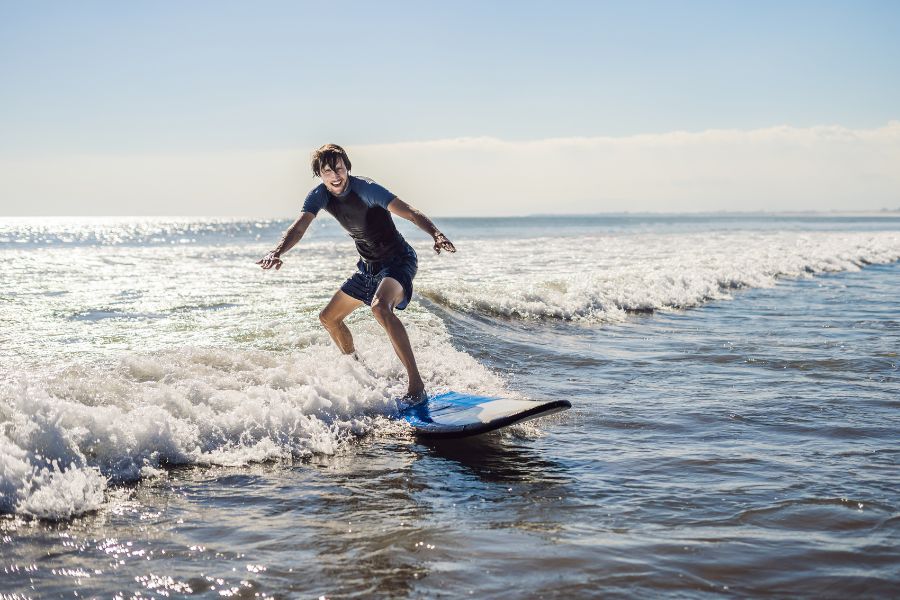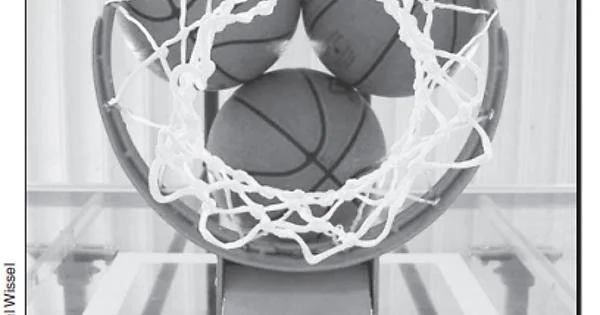How Long Does It Take to Master Surfing: Unveiling the Journey

It generally takes around 20-30 hours of practice to learn how to surf proficiently. Learning to surf varies based on individual skill and dedication.
Surfing is a popular water sport that offers a thrilling experience riding waves. Many factors influence how long it takes to become a confident surfer, including fitness, balance, and dedication to practice regularly. Beginners typically start with basic techniques such as paddling, popping up on the board, and finding the balance on the waves.
With consistent practice and guidance from experienced surf instructors, individuals can progress quickly in this exhilarating sport. Developing skills in wave selection, positioning, and maneuvering the board are key components to mastering surfing. Whether you’re a beginner or looking to improve your surfing abilities, dedication and perseverance are essential in learning how to surf effectively.

THE BASICS OF SURFING
When it comes to learning how to surf, it all starts with understanding the basics. From choosing the right surfing equipment to grasping fundamental techniques, mastering the fundamentals sets the foundation for a successful surfing journey.
CHOOSING THE RIGHT SURFING EQUIPMENT
To get started with surfing, it’s crucial to have the right equipment. Consider investing in a quality surfboard that matches your skill level. Whether you opt for a longboard, funboard, or shortboard, selecting the appropriate board can significantly impact your learning experience. Additionally, obtaining a properly fitted wetsuit and leash is essential to stay comfortable and safe in the water.
UNDERSTANDING THE FUNDAMENTAL SURFING TECHNIQUES
Understanding the fundamental surfing techniques lays the groundwork for progress and success. Mastering skills such as paddling, popping up, and riding the wave is crucial for any beginner. It’s important to focus on body positioning, balance, and timing to catch and ride waves effectively. Learning to read the ocean’s movements and wave patterns is also vital in honing your surfing abilities.
FACTORS THAT AFFECT LEARNING TIME
PHYSICAL FITNESS AND COORDINATION
how quickly one can pick up surfing skills.
PREVIOUS BOARD SPORTS EXPERIENCE
Experience in board sports like skateboarding or snowboarding
can accelerate the learning process in surfing.
QUALITY OF INSTRUCTION
instructors significantly impact the learning curve.
TYPICAL LEARNING CURVE FOR SURFING
Learning to surf can vary for each individual, but typically it takes several weeks to months of consistent practice to become proficient. It involves mastering balance, paddling, and wave selection, making it a gradual learning process.
INITIAL SURFING LESSONS
Beginners start with basic techniques like paddling, standing on the board, and catching waves.
- Get familiar with surfboard handling and safety measures.
- Learn about ocean conditions and wave behavior.
PRACTICE AND PERSISTENCE
Achieving success in surfing requires consistent practice and determination.
- Regular practice helps in improving balance and coordination.
- Stay persistent through falls and failures to progress.
ACHIEVING BASIC SURFING SKILLS
Mastering the basics of surfing may take several weeks to a few months.
- Focus on mastering efficient paddling techniques.
- Practice popping up quickly to stand on the board.
- Learn to control the board and navigate through waves.
In surfing, beginners typically start with basic techniques such as paddling, standing on the board, and catching waves. It is essential to get familiar with surfboard handling and safety measures, as well as understand ocean conditions and wave behavior. Achieving success in surfing involves consistent practice and determination. Regular practice helps in improving balance and coordination while staying persistent through falls and failures is crucial to progress in the sport. Mastering the basics of surfing, including efficient paddling techniques, quickly popping up to stand on the board, and controlling the board to navigate through waves, may take several weeks to a few months of dedicated practice.

ACCELERATING YOUR PROGRESS
Accelerating your progress in learning to surf can be an exciting and rewarding journey. By taking specific actions and incorporating the right strategies, you can significantly enhance your surfing skills and proficiency. Here are some effective ways to accelerate your progress and become a proficient surfer.
SURFING FREQUENTLY AND CONSISTENTLY
Scheduling regular surf sessions can significantly contribute to faster progress in surfing. Frequent practice allows you to familiarize yourself with the waves, improve your balance, and refine your technique. By hitting the waves consistently, you develop muscle memory, enabling you to progress at a quicker rate.
TAKING ADVANCED SURFING LESSONS
Engaging in advanced surfing lessons can provide a structured and guided approach to mastering more challenging surfing techniques. Expert instructors can offer personalized feedback and tailored instruction to address specific areas for improvement, accelerating your learning curve. These advanced lessons can help you gain confidence in navigating more demanding surf conditions and conquering bigger waves.
SETTING REALISTIC EXPECTATIONS
Learning to surf takes time and effort. It’s necessary to have realistic expectations about the learning process. The duration to learn to surf varies for each individual and is influenced by factors such as physical fitness, previous experience, coaching, and practice frequency.
Being able to glide on the waves and experience the thrill of surfing is a dream for many, but how long does it take to learn this exhilarating sport? It’s important to set realistic expectations and understand that the time it takes to become proficient in surfing can vary for each person. Here, we’ll explore the individual differences that affect the learning process and the importance of embracing the surfing journey.
UNDERSTANDING INDIVIDUAL DIFFERENCES
Learning to surf is a unique and personal journey, and it’s essential to acknowledge that individual differences play a significant role in the learning timeline. Factors such as age, physical fitness, natural ability, and previous experience with water sports can influence how quickly one progresses. Therefore, it’s crucial not to compare oneself to others and instead focus on personal growth. With consistent practice and determination, anyone can learn to surf, regardless of their age or prior skills.
EMBRACING THE SURFING JOURNEY
Surfing is more than just a sport; it’s a lifestyle that requires perseverance and a willingness to embrace the journey. From the first time you paddle out to catch a wave to the countless wipeouts, each experience contributes to your progression as a surfer. It’s important to approach the learning process with an open mind, letting go of any expectations of instant mastery. Embrace the challenges, learn from every wave, and celebrate each small victory along the way.
PRACTICE MAKES PROGRESS
When it comes to learning to surf, practice makes progress. Ideally, dedicating time for regular practice sessions is key to improving your skills. Consistency in the water allows you to develop muscle memory and become familiar with the ocean’s movements. It’s important to remember that progress may not always be linear, and setbacks are a part of the learning process. Don’t get discouraged if you have a few difficult sessions. With patience and persistence, your surfing abilities will continue to evolve.
SEEKING GUIDANCE
While surfing is a sport that can be self-taught, seeking guidance from experienced surfers or professional instructors can accelerate your progress. They can provide valuable feedback, offer safety tips, and help you refine your techniques. Learning from someone with expertise in the sport can help you avoid developing bad habits or incorrect forms. Additionally, surf schools often offer structured lessons that cater to different skill levels, allowing you to learn at your own pace in a supportive environment.
CELEBRATING MILESTONES
Learning to surf is a unique journey, and it’s important to celebrate your milestones along the way. Whether it’s successfully catching your first wave or mastering a new maneuver, acknowledge and reward yourself for your achievements. Recognizing your progress not only boosts confidence but also motivates you to continue pushing forward. Remember, every surfer started as a beginner. Embrace the process, enjoy the ride, and appreciate the joy that comes with progressing in the sport of surfing.
FREQUENTLY ASKED QUESTIONS FOR (HOW LONG DOES IT TAKE TO LEARN TO SURF)
HOW LONG DOES IT TAKE TO LEARN TO SURF?
Learning to surf typically takes several months of consistent practice and dedication to gain confidence and master the necessary techniques.
WHAT FACTORS DETERMINE THE TIME IT TAKES TO LEARN TO SURF?
The time it takes to learn to surf depends on factors such as your physical fitness, previous experience with water sports, the frequency of practice, and the quality of instruction you receive.
CAN ANYONE LEARN TO SURF REGARDLESS OF AGE?
Yes, people of all ages can learn to surf. However, younger individuals may have an advantage due to their flexibility and adaptability, while older individuals may require more time and patience to master the sport.
IS IT NECESSARY TO TAKE LESSONS TO LEARN HOW TO SURF?
While it is possible to learn how to surf on your own, taking lessons from a qualified instructor is highly recommended. They can provide guidance on technique, safety, and help accelerate your progress in the water.
CONCLUSION
Mastering the art of surfing takes time, patience, and dedication. With consistent practice and expert guidance, anyone can learn to surf. Remember, progress varies for each individual. Enjoy the process, embrace the challenges, and celebrate your achievements. Keep honing your skills, and soon you’ll be riding the waves like a pro.







